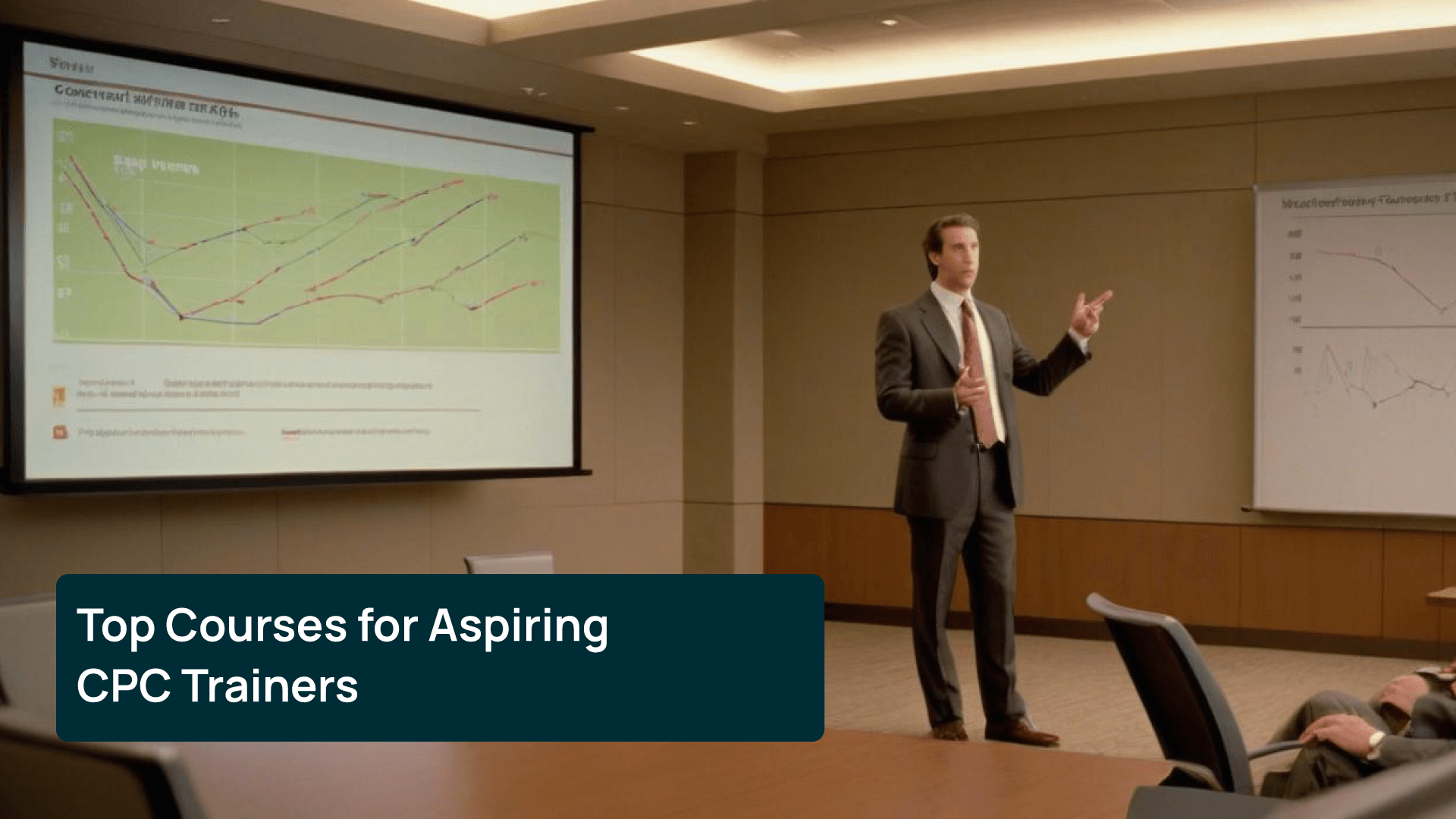Want to become a CPC trainer? This article covers everything you need to know, from the role of CPC trainers to the best training courses. Learn how to help professional drivers stay compliant and improve their road safety skills.
Key Takeaways
- CPC trainers play a critical role in delivering essential driver training that meets legal standards and promotes road safety, necessitating continuous learning to stay updated with industry regulations.
- While no formal qualifications are required to become a CPC trainer, completing a train-the-trainer course enhances teaching skills, and the certification process includes both theoretical and practical examinations.
- Aspiring CPC trainers have various training options, including traditional classroom-based and online courses, with costs ranging significantly, highlighting the importance of comparing providers for quality and value.
The Role of CPC Trainers
CPC trainers are the unsung heroes behind the wheel, responsible for delivering mandatory complete driver cpc training that helps professional pcv drivers enhance their skills and comply with legal requirements. Their role is multifaceted, focusing on key areas such as safety, legal compliance, and professional development for drivers, including national driver cpc. These trainers ensure drivers meet compliance needs while continually improving their skills and contributing to overall road safety.
CPC trainers must stay abreast of industry standards and evolving regulations to provide effective training. Continuous learning ensures CPC trainers deliver high-quality training that meets the profession’s rigorous demands.
Steps to Becoming a CPC Trainer
Becoming a driver CPC instructor involves several steps, yet no mandatory qualifications are required. The DVSA does not require formal qualifications for CPC instructor recognition. Completing a Driver CPC train-the-trainer course is not compulsory, but attending can significantly boost an instructor’s confidence and teaching efficacy.
Driver CPC trainer courses typically span five days and focus on practical teaching techniques. The courses cover a variety of topics. These include teaching methods, time management, handling questions, proper administration of the Driver CPC system, and driver cpc periodic training. While beneficial, these courses are not mandatory for CPC instructor approval.

Certification Requirements for CPC Trainers
The DVSA and its dvsa training accreditation team set the standards for Driver CPC Instructors, who must demonstrate competence and possess necessary knowledge and skills as outlined by the vehicle standards agency. The certification process involves a two-part examination: a theory and a classroom instruction exam, designed to assess understanding of instructional techniques, driving legislation, and eco-safe driving practices.
The 75-minute theory examination consists of 70 multiple-choice questions covering various topics. Instructors must achieve an overall pass mark of 85% to qualify. The classroom instruction examination is a 30-minute assessment, with a pass mark set at 84 out of 120.
Prospective instructors should prepare thoroughly for these examinations through relevant training and by consulting training providers about their pass rates, standards, and processes. No specific examination is required for the CPC instructor course, but a general understanding of the subject matter is essential.
Training Options for CPC Trainers
Aspiring CPC trainers have several training options, ensuring flexibility and accessibility in their certification journey. These options include traditional classroom-based training and online or e-learning alternatives, each with its unique benefits and considerations.
These options help trainers select the most suitable path for their professional development.
Classroom-Based Training
Classroom-based training remains the preferred method, offering a structured environment that enhances interaction and learning. Typically, these courses last five days and are conducted in person, allowing trainers to benefit from face-to-face instruction and immediate feedback.
In these settings, instructors cover essential topics like managing a classroom and ensuring comprehensive understanding of the material. The interactive nature of classroom-based training fosters a more engaging and enriching learning experience for both trainers and trainees.
Online and E-Learning Alternatives
Online CPC instructor courses offer scheduling and location flexibility, making them a viable option for some trainers. E-learning platforms can provide the necessary training over a shorter duration, such as the two-day International Driver CPC training, which includes e-learning components.
These alternatives allow trainers to balance professional commitments with training needs. Despite their convenience, online courses may lack the interactive benefits of face-to-face learning, which potential CPC instructors should consider.

Costs Associated with CPC Trainer Courses
Driver CPC training course costs can vary widely, ranging from £700 to £7,000 depending on the provider. No maximum price limit exists, so comparing at least three training providers is important to find a course that fits your quality expectations and budget.
Providers like RTITB may charge higher fees but justify the cost with comprehensive and well-structured training programs. Prospective trainers should balance cost considerations with training quality to ensure the best possible education and preparation.
Comparison of Training Providers
Choosing the right training provider is crucial. Contact at least three companies and compare their offerings to ensure a good deal. Balance cost with the quality and comprehensiveness of the training to avoid overpaying while still receiving high-quality education.
RTITB is a notable training provider known for its high-quality but expensive CPC training programs. Recommendations from industry associations can help identify reputable, DVSA-accredited training providers tailored to specific sectors. Shopping around can help you find a course that fits your needs and budget while maintaining high quality.
Importance of Industry Experience
Industry experience equips CPC trainers with practical insights and real-world examples that enhance training quality. Trainers with extensive industry backgrounds can engage learners better by sharing experiences and addressing specific questions and scenarios during training. Such experience helps CPC trainers manage classroom dynamics effectively and maintain learner interest, making sessions more interactive and relevant.
Prior teaching experience is not necessary but certainly benefits trainers in delivering effective Driver CPC training.
Maintaining Professional Competence
Maintaining professional competence is crucial for staying updated with changing regulations and industry standards. Continuous professional development is essential, and trainers should engage in periodic training to keep skills and knowledge current. Allocating time for professional development and selecting relevant courses each year can significantly enhance a trainer’s qualifications.
Providing evidence of attendance and training completion to drivers after courses is a key responsibility.
Joining the National Register of LGV Instructors
Joining the National Register of Driver CPC Instructors requires passing a two-part examination at an approved center. Experienced CPC instructors can join the National Register of LGV Instructors by completing the assessment and submitting a registration form.
Operated by RTITB and supported by Logistics UK and RHA, the National Register provides instructors with a certificate and ID card, validating professional status. Registered instructors can use the National Register logo on promotional materials, enhancing career opportunities and professional recognition.

Summary
In summary, becoming a CPC trainer involves understanding their critical role, meeting certification requirements, and exploring various training options. The journey includes balancing costs, comparing training providers, and leveraging industry experience to enhance training quality. Maintaining professional competence and joining the National Register of LGV Instructors are essential steps in solidifying one’s status as a qualified CPC trainer.
Embark on this fulfilling career path with confidence, knowing that you are contributing to the safety and professionalism of the driving industry. Whether you choose classroom-based training or online alternatives, your commitment to continuous learning and professional development will ensure your success as a CPC trainer.
Frequently Asked Questions
What are the mandatory qualifications to become a CPC trainer?
To become a CPC trainer, there are no mandatory qualifications required. However, possessing relevant experience and knowledge in the field can enhance your effectiveness as a trainer.
How long do typical CPC trainer courses last?
Typical CPC trainer courses last around five days. This duration provides ample time for comprehensive training and preparation.
What is the cost range for CPC trainer courses?
The cost for CPC trainer courses typically ranges from £700 to £7,000, depending on the training provider. It is essential to research various options to find the best fit for your needs.
What are the benefits of joining the National Register of LGV Instructors?
Joining the National Register of LGV Instructors offers professional recognition, a certificate, an ID card, and enhanced career opportunities, making it a valuable step for advancing your career in this field.
Why is industry experience important for CPC trainers?
Industry experience is crucial for CPC trainers as it equips them with practical insights that enhance the training quality and enable them to effectively address specific questions and real-world scenarios faced by trainees.



